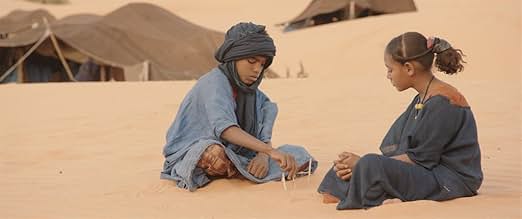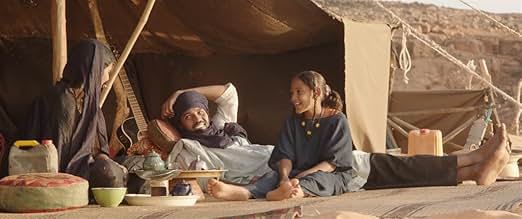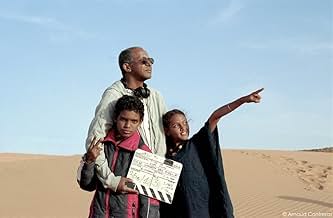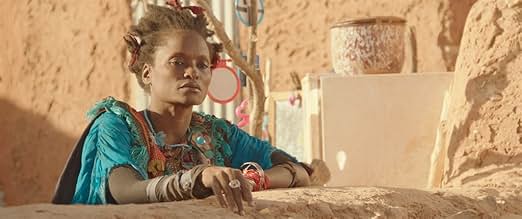Timbuktu
- 2014
- Tous publics
- 1h 36m
IMDb RATING
7.1/10
19K
YOUR RATING
A cattle herder and his family who reside in the dunes of Timbuktu find their quiet lives -- which are typically free of the Jihadists determined to control their faith -- abruptly disturbed... Read allA cattle herder and his family who reside in the dunes of Timbuktu find their quiet lives -- which are typically free of the Jihadists determined to control their faith -- abruptly disturbed.A cattle herder and his family who reside in the dunes of Timbuktu find their quiet lives -- which are typically free of the Jihadists determined to control their faith -- abruptly disturbed.
- Director
- Writers
- Stars
- Nominated for 1 Oscar
- 33 wins & 28 nominations total
Ibrahim Ahmed
- Kidane
- (as Ibrahim Ahmed dit Pino)
Yoro Diakité
- Djihadiste
- (as Yoro Diakite)
Weli Kleïb
- Juge
- (as Weli Cleib)
- Director
- Writers
- All cast & crew
- Production, box office & more at IMDbPro
Featured reviews
"Timbuktu" is a brave film from Mauritania that shows what it's like in a small African town after it's been taken over by Jihadists determined to enforce Sharia Law. However, I should warn you--the film is far from enjoyable and seems rather hopeless and it also lacks the usual resolution you'd expect in a movie. This is not a criticism, as giving it a happy ending would have been ridiculous.
The film shows a variety of scenarios in which harsh Muslim law is implemented. Having fun of any type seems illegal--no singing, no music, no playing soccer...nothing. In addition, a man kills another man in self-defense and is brought to this tribunal...and his family is now left defenseless without a man to protect him.
Considering the film's pedigree, it is amazingly professional looking. The music is excellent and haunting, the acting very natural. Overall, a sad but intense drama that shows a slice of life...a very ugly slice.
The film shows a variety of scenarios in which harsh Muslim law is implemented. Having fun of any type seems illegal--no singing, no music, no playing soccer...nothing. In addition, a man kills another man in self-defense and is brought to this tribunal...and his family is now left defenseless without a man to protect him.
Considering the film's pedigree, it is amazingly professional looking. The music is excellent and haunting, the acting very natural. Overall, a sad but intense drama that shows a slice of life...a very ugly slice.
I don't believe there is one frame in this film that is not gorgeous, that couldn't be displayed as a photograph at a gallery. The muted colors of the desert, the medieval architecture of the town, the tragically expressive faces always glowing in a magical light--all of it is almost painfully beautiful. The story is beyond tragic. By seemingly digressing into numerous anecdotes illustrating the quirks of the population, the director allows us to appreciate deeply the texture and social fabric of the community that is being poisoned by madness. We see in particular its effect on an extremely appealing but by no means sanctified family. This is one of the film's extraordinary strengths as well. No character is oversimplified; even the appalling jihadists are granted their humanity. I've seen "Boyhood" and "Birdman", the apparent favorites for the Oscar. "Timbuktu" utterly blows both those fine movies out of the water.
"Let me say this loud and clear. There is a world of difference between terrorist acts and the Islamic Shari'a. Islam is not only a religion, but a way of life. And at its heart lie the sacred principles of tolerance and dialogue." King Hussein I
A popular cliché is to refer to "Timbuktu" as the farthest, out-of-it-all place on earth, like "You can go to Timbuktu for all I care." However, in writer/ director Abderrahmane Sissako's remarkable film, Timbuktu, the world rests in miniature in the sand dunes of gorgeous Mali, where a Bedouin family can languish in the shade of their tent while a small boy herds their cattle and nearby fishmongers ply their trade by a welcoming pond. It is a world seemingly removed from stress, a paradise.
In the cell-phone age, no one is too far away and paradise easily shattered, as the natives use their phones to coordinate their herds and their lives. So do the Muslim jihadists, who use their phones to control the natives, bending them to their will on such mundane matters as wearing gloves and playing music. In a way, the low-key policing by the jihadists employing Shari'a seems to contrast with the notorious ISIS, whose control extends to burning and beheading.
All is relatively tame until one Bedouin's pregnant cow is killed by a fishmonger, and the herder murders in revenge. The Long-distance wide-angle shot of the two men in a death struggle is remarkably beautiful and ominous, like David Lean's memorable Lawrence of Arabia scenes.
The local jihadist authority follows God's law in this case while it takes a woman into custody for not wearing gloves and carries out murderous punishment on musicians. This tranquil paradise slowly becomes a hotbed of repression while the director still shoots lovely scenes that belie the suppression already reaching into the lives that seemed so far removed.
Underneath the obvious meting out of "justice" is the subjugation of women, almost as if radical Muslim orthodoxy had this prejudice as its cornerstone. This film drives that oppression home as few others have done because it makes it a quiet but persistent issue in daily activity. The very peacefulness of the living in Mali and the sweet sparseness of the mise en scene could almost make us think the radicalism is acceptable. But when you see men buried in sand and rocks thrown at their heads, you know life in the sand in not romantic.
Timbuktu is rated PG-13, a triumph in good taste as murder and subjugation are the dominant activities. A film that allows young persons to see the world's injustices through a beautiful lens is a film worth sharing in the hope of removing radical Islamists from paradise. Let them have their virgins and soon.
A popular cliché is to refer to "Timbuktu" as the farthest, out-of-it-all place on earth, like "You can go to Timbuktu for all I care." However, in writer/ director Abderrahmane Sissako's remarkable film, Timbuktu, the world rests in miniature in the sand dunes of gorgeous Mali, where a Bedouin family can languish in the shade of their tent while a small boy herds their cattle and nearby fishmongers ply their trade by a welcoming pond. It is a world seemingly removed from stress, a paradise.
In the cell-phone age, no one is too far away and paradise easily shattered, as the natives use their phones to coordinate their herds and their lives. So do the Muslim jihadists, who use their phones to control the natives, bending them to their will on such mundane matters as wearing gloves and playing music. In a way, the low-key policing by the jihadists employing Shari'a seems to contrast with the notorious ISIS, whose control extends to burning and beheading.
All is relatively tame until one Bedouin's pregnant cow is killed by a fishmonger, and the herder murders in revenge. The Long-distance wide-angle shot of the two men in a death struggle is remarkably beautiful and ominous, like David Lean's memorable Lawrence of Arabia scenes.
The local jihadist authority follows God's law in this case while it takes a woman into custody for not wearing gloves and carries out murderous punishment on musicians. This tranquil paradise slowly becomes a hotbed of repression while the director still shoots lovely scenes that belie the suppression already reaching into the lives that seemed so far removed.
Underneath the obvious meting out of "justice" is the subjugation of women, almost as if radical Muslim orthodoxy had this prejudice as its cornerstone. This film drives that oppression home as few others have done because it makes it a quiet but persistent issue in daily activity. The very peacefulness of the living in Mali and the sweet sparseness of the mise en scene could almost make us think the radicalism is acceptable. But when you see men buried in sand and rocks thrown at their heads, you know life in the sand in not romantic.
Timbuktu is rated PG-13, a triumph in good taste as murder and subjugation are the dominant activities. A film that allows young persons to see the world's injustices through a beautiful lens is a film worth sharing in the hope of removing radical Islamists from paradise. Let them have their virgins and soon.
One of the movies that's still in the running for a "Best Foreign Language Film" Oscar nomination, is Timbuktu. Together with the Estonian Mandariinid it's one of my favorites for this year's Academy Awards, but I'm afraid only one of them will make it to the shortlist and neither of them will eventually win the Oscar. Not while movies like Ida, Turist and Leviathan are their competitors (although I think Timbuktu and Mandariinid are better than those three). The thing about Timbuktu that makes it such a beautiful picture, is its, what I presume, authentic representation of Muslims and the different views on Islamic religion. Spoken in a number of languages, from French and English to Arabic and a wide diversity of African languages (Tamasheq, Bambara and Songhay), Timbuktu shows Westerners a part of the world we almost know nothing about. Apart from judgemental and arrogant claims about the (religious) backwardness of many people there, be they Berber or Bedouin, many people here just don't know what to say about the Northern part of Africa. Director Abderrahmane Sissako gives us lots of stuff to talk and think about (for example the use of "jihad" as on the one hand an inner struggle (the greater jihad) and on the other hand an external holy war which is fought by mujahideen - the second jihad being the one we fear and loathe so much in the West). Not only that, but together with his cinematographer Sofian El Fani (La Vie d'Adèle) he manages to provide us with wonderful visual poetry and exceptional sceneries of south-east Mauritania. While it took some getting used to the narrative and the editing, I was full of awe after enjoying this utterly majestic work of art. Highly recommended!
In the middle of the beauty of Saharian Africa, a shepherd and his lovely wife have to face the punishment of jihad's authorities in Timbuctu, a town in Mali. Religious authorities control even the most intimate gestures in the middle of crude poverty. A moral dictator, as usual conducts himself in double standard. Jihadism, persecutes not only sensual expressions such as the beauty of songs and music played by the people in the village, but also any expression of individuality. Amine Bouhafa's, music compositions are profoundly moving as also the sound of the original language, a soothing tender sound. The random of being born in such a place simply changes the life and options of the characters, leaving very little to free will.
Did you know
- TriviaIn 2015 Timbuktu became the first film shot in Mauritania by a Mauritanian director to win at the Cesar film awards. It won seven awards out of its eight nominations including Best Film, Best Director, Best Original Screenplay, Best Editing, Best Cinematography, Best Music and Best Sound, thus setting the record for being the African film with the most awards ever.
- GoofsIn the stoning scene, both man and woman are buried up to their necks. In a proper Islamic stoning (rajm), the woman should only be buried up to her waist.
- ConnectionsFeatured in The Oscars (2015)
- SoundtracksShooting The Statues
Composed, Arranged and Orchestrated By Amine Bouhafa
with The City of Prague Philharmonic Orchestra
© 2014 Universal Music France
- How long is Timbuktu?Powered by Alexa
Details
- Release date
- Countries of origin
- Official sites
- Languages
- Also known as
- Le chagrin des oiseaux
- Filming locations
- Oualata, Mauritania(as Timbuktu)
- Production companies
- See more company credits at IMDbPro
Box office
- Gross US & Canada
- $1,076,075
- Opening weekend US & Canada
- $45,110
- Feb 1, 2015
- Gross worldwide
- $7,179,391
- Runtime1 hour 36 minutes
- Color
- Aspect ratio
- 2.35 : 1
Contribute to this page
Suggest an edit or add missing content



























